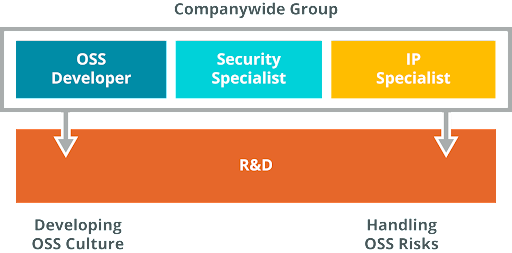More Time on Innovating, Less Time on Compliance
Dan Whiting | 15 April 2022
I am old enough to remember when organizations developed software in-house – all of it. I also clearly remember my information systems college professor teaching it is almost always less expensive and better to use code/programs already written and adapting them for your use than to recreate the wheel from scratch.
It is a different world now – software is built on a foundation of other programs, libraries, and code bases. Free and open source software (FOSS) is key to this because it is so easy to pickup, use, share, and create code. What an opportunity to speed development and focus innovation on the next thing rather than creating what already exists. This is part of the value of open source software – collaborate on the building blocks and innovate and differentiate on top of that.
However, there are also challenges in this space, with a good example being the question of how to address licensing. There are A LOT of types of licenses that can apply to a piece of software/code. Each license needs to be understood and tracked with each piece of software it is included in for an organization to ensure nothing is missed. This can quickly multiply into a significant catalog that requires lots of manual work. On top of that, you also need to provide that license information to each of your customers, and they will have their own system and/or processes for providing that information to them and making sure it is up-to-date with each new version of the software.
You can see where this can quickly consume valuable staff resources and open doors to mistakes. Imagine the possibility of a standard way to track and report the licenses so your teams don’t need to worry about all of the digital paperwork and can instead focus on innovation and adding value to you and your customers.
This is exactly the problem a team of lawyers and governance experts sought to fix back in 2016 and created the OpenChain Project to do just that. They asked, what are the key things for open source compliance that everyone needs, and how do we unify the systems and processes. They envisioned an internationally accepted standard to track and report all of the licenses applicable to a software project. The end result is a more trustable supply chain where organizations don’t need to spend tons of time checking compliance again and again and then remediating.
The result – a ISO standard (ISO/IEC 5230) was approved in Q4 2020. The OpenChain Project also hosts a library of 1,000 different reference documents in a wide variety of languages – some are official and many more are community documents, like workflow examples, FAQs, etc.
How are organizations benefiting from OpenChain? I find it encouraging that Toyota is one of the leaders in this. As anyone who has had at least one business class in college knows, Toyota is a leader in innovations for manufacturing over several decades. In the 1970s they pioneered supply chain management techniques with the Toyota Production System (please tell me they had to do TPS reports) – adopted externally as Just in Time manufacturing. They are also known for adopting the philosophy of Kaizen, or continuous improvement. So, as they looked at how to manage software supply chains and all of the licensing, they adopted the OpenChain Specification. They implemented it, in part, with a governance structure and an official group to manage OSS risks and community contributions.
Toyota’s OSS governance structure

They are also an active participant in the OpenChain Japan Working Group to help identify bottlenecks across the supply chain, and the group enabled Toyota to develop information sharing guidelines to address licensing challenges with Tier 1 suppliers. They now see reduced bottlenecks, more data for better decision making, and decreased patent and licensing risks. Read more.
PwC is a global auditing, assurance, tax, and consulting firm. As an auditor, much of their business revolves around building trust in society. They also develop software solutions for thousands of clients around the world and receive software from providers of all sizes and maturity levels, making OSS compliance difficult. It was a tremendous effort and caused time delays for them and their clients. Now, PwC is able to provide clients with an Open Source Software compliance assessment based on the latest OpenChain specification. Their clients can share an internationally-recognized PwC audit report to verify OSS compliance. Read more.
And just last month, SAP, a market leader in enterprise application software, announced they are adopting the OpenChain ISO/IEC 5230 standard. It marks the first time that an enterprise application software company has undergone a whole entity conformance. Their reach across the global supply chain is massive – its customers are involved in almost 90% of global trade.
As the ISO/IEC standard is done, what is next for OpenChain? They are looking at security, export control, and more.
If you or your organization are interested in learning more about OpenChain, adopting the standard, or getting involved in what is next, head over to https://www.openchainproject.org/. We also host an online training course when you are ready to dig in: Introduction to Open Source License Compliance Management.
My hope is that you now spend less time on compliance and more time on innovation.